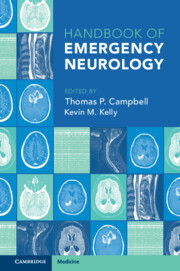Book contents
- Handbook of Emergency Neurology
- Handbook of Emergency Neurology
- Copyright page
- Contents
- Contributors
- Section 1 Neurologic Examination and Neurodiagnostic Testing
- Section 2 Common Neurologic Presentations: A Symptom-Based Approach
- Section 3 Specific Neurological Disorders in Emergency Medicine
- Chapter 11 Ischemic Stroke and Transient Ischemic Attack
- Chapter 12 Intracranial Hemorrhage
- Chapter 13 Seizures
- Chapter 14 Infections of the Central Nervous System
- Chapter 15 Traumatic Brain Injury
- Chapter 16 Increased Intracranial Pressure and Herniation Syndromes
- Chapter 17 Traumatic and Nontraumatic Spinal Cord Disorders
- Chapter 18 Neuro-ophthalmology Emergencies
- Chapter 19 Brain Tumors and Other Neuro-oncologic Emergencies
- Chapter 20 Peripheral Nerve and Neuromuscular Disorders
- Chapter 21 Movement Disorders
- Chapter 22 Multiple Sclerosis
- Chapter 23 Hydrocephalus and Shunt Evaluation
- Chapter 24 Post-Arrest Neurologic Resuscitation
- Chapter 25 Neurotoxicology
- Chapter 26 Neurologic Emergencies of Pregnancy
- Chapter 27 Brain Death
- Chapter 28 Hysteria
- Index
- References
Chapter 13 - Seizures
from Section 3 - Specific Neurological Disorders in Emergency Medicine
Published online by Cambridge University Press: 10 January 2024
- Handbook of Emergency Neurology
- Handbook of Emergency Neurology
- Copyright page
- Contents
- Contributors
- Section 1 Neurologic Examination and Neurodiagnostic Testing
- Section 2 Common Neurologic Presentations: A Symptom-Based Approach
- Section 3 Specific Neurological Disorders in Emergency Medicine
- Chapter 11 Ischemic Stroke and Transient Ischemic Attack
- Chapter 12 Intracranial Hemorrhage
- Chapter 13 Seizures
- Chapter 14 Infections of the Central Nervous System
- Chapter 15 Traumatic Brain Injury
- Chapter 16 Increased Intracranial Pressure and Herniation Syndromes
- Chapter 17 Traumatic and Nontraumatic Spinal Cord Disorders
- Chapter 18 Neuro-ophthalmology Emergencies
- Chapter 19 Brain Tumors and Other Neuro-oncologic Emergencies
- Chapter 20 Peripheral Nerve and Neuromuscular Disorders
- Chapter 21 Movement Disorders
- Chapter 22 Multiple Sclerosis
- Chapter 23 Hydrocephalus and Shunt Evaluation
- Chapter 24 Post-Arrest Neurologic Resuscitation
- Chapter 25 Neurotoxicology
- Chapter 26 Neurologic Emergencies of Pregnancy
- Chapter 27 Brain Death
- Chapter 28 Hysteria
- Index
- References
Summary
There are an estimated 150,000 new cases of epilepsy per year in the United States, with prevalence rates of 7–8 per 1,000 persons. These data, combined with the large number of patients who have seizures from nonepileptic causes, indicate that seizure occurrence is relatively frequent and can result from diverse causes. Although many patients who have a seizure do not need emergency department (ED) care, some present to the ED critically ill and require immediate, definitive management. Advances in the understanding of seizure types and use of new antiseizure medications have enhanced the emergency physician’s ability to diagnose the cause of a patient’s seizures accurately and to treat both the underlying abnormality and the seizures in a rational and systematic fashion.
Keywords
- Type
- Chapter
- Information
- Handbook of Emergency Neurology , pp. 189 - 206Publisher: Cambridge University PressPrint publication year: 2023

